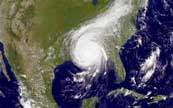 Katrina Update #49
Katrina Update #49 Katrina Update #49
Katrina Update #49This is a rather long update, so grab a cup of coffee and pull up a chair.
As reported in last week's update, Coop's Place had a fire in the kitchen that was a little too big to be easily contained. One thing led to another, and, well, the city Health department shut him down. He can still serve cold food and drinks, but nothing that needs to be cooked. For those of you who haven't been following his plight, let me sum it up for you: in July he lost his beloved bulldog, Buster; Katrina took away his home in Lakeview and his 1967 El Camino, which he had spent boku bucks on restoring (it was stolen from the Sewell Chevy dealership where it had been taken for service). So now, after an October that just about made up for the business lost in September, he gets yet another blow.
Well, he decided to take his lemons and make some lemonade. A lot of the equipment in the kitchen has been there a very long time. So he is taking this opportunity to gut the entire area and rebuild it the way he wants it to be, replacing old equipment in the process. It is not known at this time when it will re-open, but you can bet he wants it to be as soon as possible. So on Tuesday morning I helped Coop measure all the important parts of the kitchen so he could begin redesigning it.
In the meantime, we are probably going to have Thanksgiving dinner there again this year. It won't be the lavish affair Janis and I did for our 25th wedding anniversary last year, but if you are reading this, you are invited to join us — just let us know you are coming so we can prepare enough food.
After helping Coop measure the kitchen, he and I hopped in Doc Schaffer's van and headed out to see if we could find anything left of our boats. We had seen the aerial photographs of the area, so we weren't hopeful. This is an area that saw the most devastation, as the west side of the eye wall passed directly over it. To get there, we had to travel through St. Bernard Parish, where we saw first hand what was left of Arabi and Chalmette. You just don't get used to it. The water was anywhere from 6 to 20 feet deep, except for the area right next to the Mississippi River.
Doc and Coop both belong to a organization whose sole reason for existence is fishing. They have a corporation, and its members have an initial fee to join, followed by monthly and annual dues. The name of this organization is the Shell Beach Literary Society. I have been there several times, as a guest of either Doc or Coop and helped out with a cookout there earlier this year. I also did a newsletter for them. Here's how the fishing camp looked after Katrina:
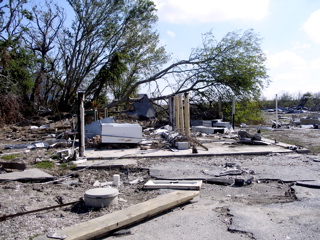
Shell Beach Literary Society — Front View
I wish I had a "before" picture to show you. It wasn't much to look at really, built for utility rather than beauty. But it definitely served its purpose. It was a two story structure. The 2nd floor as dormitory style, with room to sleep about 20 people. Downstairs was a large living/dining area and a commercial kitchen. Outside the side door was a great patio with a gas grill.
In the middle of the property was a lone playing card. No other playing cards were in sight, and it didn't look like it was placed there on purpose, except perhaps by the devil himself:
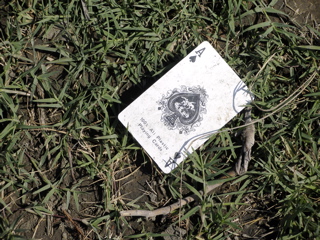
Ace of Spades on Shell Beach Literary Society lot.
It was hard to get your bearings in this completely restructured world. Complete homes were gone, the only sign that they were ever there was the steps leading up to where the home once was, as in this picture of Blackie Campo's:
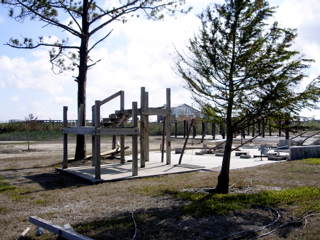
Blackie Campo's home in Shell Beach.
From here, things actually get a little bizarre In the middle of where the boat sheds used to be for the Shell Beach Literary Society we found this:
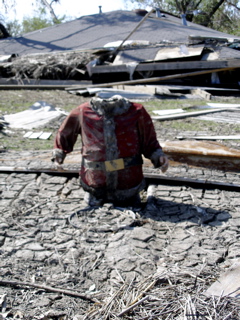
Santa Suit in Shell Beach
Our best guess is that this came out of an attic — maybe the attic from the collapsed house in the background — and was deposited here as the storm surge waters receded
There is a community of upscale fishing camps behind the Shell Beach Literary Society and Campo's Marina called Proctor's Landing. We took a walk through it and found the following:
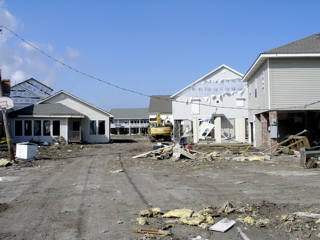
The home on the left used to be on the pilings on the right.
We ran into a resident cleaning his house. He said the storm surge was over 20 feet. Apparently the home in the picture above was not secured to its pilings very well, and as the storm surge rose above the bottom of the house, it simply picked it up and the home floated over and bumped into the next house across the road. As the waters receded, the home was gently lowered to its current resting position, about 100 feet from where it originated!
Imagine a steadily rising wall of water until it starts coming into your living room which is 18 feet off the ground! Now imagine that water continuing to rise until you have 2-3 feet of water in your living room. Here's what it looks like when the water goes away:
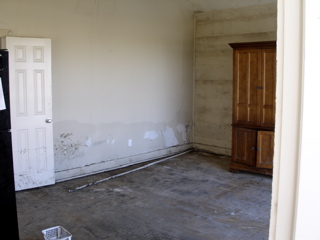
The floor where I am standing to take this picture is 18 feet off the ground.
The water mark is 2-3 feet up the wall!
Needless to say, none of us found our boats, although we did see plenty of other boats. I imagine that if we had seen ours, it would have looked something like this:
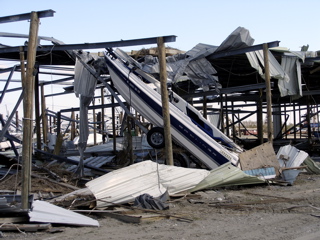
Boat at Breton Sound Marina.
The boat in the above picture was on the other side of where we think my boat was stored. It was hard to tell because it was very difficult to recognize where one shed ended and another began.
In the entire trip, we only saw one home that seemed to have survived relatively unscathed:
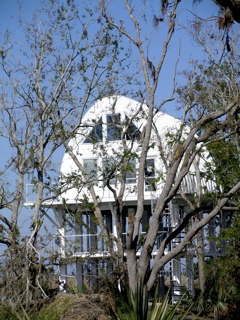
Well-constructed hut near Hopedale.
As much as I try, I cannot begin to express the totality or quantity of the devastation we witnessed. If you have ever seen a what a tornado does, imagine that over an area larger than the size of Rhode Island. Now imagine that entire area covered with water anywhere from 3 to 20 feet deep. If you have been in an Earthquake, imagine an area the size of Rhode Island devastated by one with a magnitude of 8 on the Richter scale. Now imagine the rubble blown miles from its original location by wind, then blown again in the opposite direction with the same force. Now imagine the resulting mess under 3 to 20 feet of water. It is unimaginable and incomprehendable. You can see more pictures of the area in the Gallery section.
While we were at Breton Sound Marina, we talked to one of their employees, Glen Sanchez. He left Hopedale (where Breton Sound Marina is located) on Sunday morning, August 28th, with his boat in tow. He parked the boat under the carport at his mother's house in Arabi, which is just the other side of the Orleans-St. Bernard Parish line in St. Bernard Parish. He told us about how, on Monday morning around 6AM he heard a "new noise" that compelled him to open the front door to check it out. He saw water coming down the street towards the house. He shut the door and headed back to his boat, which he had already loosened from its trailer, but secured to the carport. He threw some bottled water and beef jerkey in the boat and went back in to get his raincoat. When he did, water was already coming in the front door.
With raincoat on, he heads out to ride out the storm — and the storm surge — in his boat, protected somewhat by the carport. It wasn't too log before he sees a house from across the street come off its foundation and float by. It lodged itself next to the house, helping to block the wind. Then the carport cover collapsed pinning the boat so it could not float away. This turned out to be a good thing. A bit later a garage across the street comes off its foundation and floats up to near where Glen was huddled in the front of his boat, underneath the collapsed carport roof. This created a sort of cul de sac which provided a bit of protection from the 100+ mile per hour winds. Meanwhile, the water continued to get deeper, and the back of the boat became almost vertical with the rising flood waters. Glen had to move.
Not having any other choice, he climbs up his boat towards the stern and onto the roof of the house. He then swims across to another house, where he stayed for about an hour on the lee side, protected somewhat from the wind. Eventually he was able to get in an attic window, where he rode out the rest of the storm.
That afternoon (this is still Monday, August 29th, btw) Glen was rescued by a boat which took him to a Region's bank, where several other residents had been evacuated to the second floor. He stayed there until Wednesday, August 31st. At that point, some people he characterized as "of questionable character" were brought to the bank. Fearing for his safety, he jumped out of a window and swam to Andrew Jackson High school in Arabi, where he rested for awhile on the roof. Once rested, he swam towards the river until the water became shallow enough for him to wade through. After making it to the levee of the Mississippi River he started walking down river to the Kaiser plant, where an emergency station was set up.
Several days before this, Glen's son, who evacuated the area with Glen's mother had told some local officials he knew to "take care of my daddy if you see him." Exhausted, Glen collapsed at the feet of the very men who were asked to take care of him. From the Kaiser plant he was airlifted to the Superdome, and then bussed out of New Orleans. On the way out of town he learned the bus was headed for Dallas. Not wanting to go to Dallas, he got off the bus at LaPlace, which is about 20 miles west of New Orleans. From there he made his way back to New Orleans.
Glen told us that during his ordeal he found himself on more than one occasion talking to a deity not spoken with since a child. He apologized profusely for his lack of diligence in this regard, and now figures that God must have something special in store for him since he made the effort to keep him alive.
Okay. Shake off the devastation, because we are all about hope and rebuilding now. I'd like you to consider joining us for next year's Mardi Gras celebration, February 23-28. The city usually celebrates with an 11 day festival, but most people come for the last weekend anyway. To keep the costs down for the city, no parades will roll until Thursday February 23rd, and all parades will need to roll within an 8 hour window since the city has no budget for overtime. I predict this will be the best Mardi Gras in the history of the city. If at all possible, please make plans now to join us. All the parades except (maybe) Endymion will roll down the St. Charles parade route, which just happens to be very, very close to our house. Hotels are already 40% booked (usually by this time they are 80% booked), but if you hurry you can get your reservation in. The best news is that most hotels are not raising their rates this year in order to encourage people to come on down.
If you can't afford a hotel, come on down anyway. We are planning on putting people on air mattresses and sleeping bags until they are literally wall to wall. Cary will probably have a place by then, so there will probably be some more floor space there — especially since he probably will not have completely furnished it by then.
I can't overstate this: whether you have ever been to Mardi Gras or not, this is the one you do not want to miss. We are already planning our menu, and we will have some of the best food you have ever eaten in your life, I GARONTEE. If you are reading this, you are invited. Go to the people page and click on my name to send me an email, or call my cell phone.
- Keith Davis sent an email out to his friends and family that offers a great prospective on what life is like outside New Orleans, yet still in a region very much affected by Hurricane Katrina. I thought I would share it with you here:
What's two months? Eight weekends? Eight chances for the Packers to win or lose, eight trips out with the fishing boat, a couple of trips to the grocery store? Or, it could be another eight weeks without electricity, sixty-days with no income and a borrowed room and bed. Or, another eight weeks of 12-hour days cleaning up debris and helping people to sort out their lives. There are great differences between what most of us call normal and what many people of the Gulf South are living now.
One catch-phrase that keeps occurring in conversation is, "When this is all over…" "When this is all over, things will be better…" "When this is all over, I'm going to get some sleep…" "When this is all over…" And, yes, it will be all over eventually. But, it won't be for a long time yet. Here in Hammond/Ponchatoula most of the wires are up off the ground, many of the trees have been hauled away and most people are back home and back to work. But, about three weeks ago Diane and I took a drive over into the Waveland and Bay St. Louis area of Mississippi. What we found were mile upon mile of major business and residential roads totally devastated, large boats still hung up in leafless trees, groups of cars that had been washed together and carried along only to be deposited in heaps like driftwood. And everywhere, groups of men in hard hats working a full speed, to clear away the debris and get society moving again. And, this was after two months. We didn't have the heart to see it before this, and I am still stunned by what I saw.
Although the Katrina-story has slipped off your evening news doesn't mean that it is over. For hundreds of thousands of residents it is still page-one news. They are living in tents in Mississippi, they are still eating MREs and they are here working everyday to re-claim their lives. Others have just gone away, probably never to return.
I still hear stories from people I meet, and I meet as many as I can. Diane says I should write a book called "Stories the Rocker Told Me" as so many people come into the shop, head for my old rocking chair and just begin to talk. As before, many of the stories are good ones, many are hopeful and almost all are thankful.
One family this week told me about seeing a six-inch diameter pine tree top blowing in through the bathroom window and shooting half-way through the house before it stopped. No one was injured. Another told me about sitting and watching the wind. It seems that the rain, when driven fast enough actually vaporizes and looks more like fog, but with real weight to it. He said that the memory of seeing large trees, lifted out of the ground, roots and all, and simply blowing away will remain with him the rest of his life. I heard this week about a fellow who stayed behind, sending his family out of harms way so that he could stay behind with his family's pets. When things got too dangerous after the storm he reluctantly left the animals behind and drove his fishing boat several miles down a main highway and over several levees to an evacuation center. After nearly a month in a state of limbo and being re-united with his family, he was called to Atlanta by a stranger who had rescued his dog and was feeding him till the man could come over. The strangest things often turn out the best.
One man brought in a Walmart bag this week with the parts of a water-damaged violin. It belongs to his elderly father-in-law who lost everything (another local catch-phrase, and it means just what it says...). The violin had been a gift to the old man from his mother when he was a youngster and he sat and cried when the family told him it must be discarded like all the rest of his possessions. They snuck it out of the trash and brought it to me. We will restore it fully and hope to do our part to provide some emotional relief for the old man when it is complete. Christmas is coming, and surprises are everywhere.
One of my clients came in and told me that he had taken his mother-in-law back to her home near the infamous 17th Street Canal in New Orleans. She went to collect her belongings, what she could find. Well, she found the three photographs she had hoped to find and announced that she was ready to go. When they asked if she wanted to get her silver service or anything else she told them (very plainly by his description) that she didn't need any of that stuff, just the three pictures.
Another lady told me about her Aunt, who went through her muddy and waterlogged house and collected a little shoe-box of the things she wanted to save, and hauled everything else out to the street. The FEMA crew came by to collect waste and took everything off the curb, AND her shoebox full of items off the porch. The only balance in this is that if she had put things on her porch before the hurricane they would have disappeared overnight then, too.
The other major catch-phrase is, "everything has changed" and that, too, means what it says. The US Postal Service doesn't run as well as it used to. Phone service is spotty and many local numbers, some just down the street now must be dialed with a One, then the Area Code and the number. Virtually every parking place is filled, day and night in Hammond. The Hammond Walmart keeps all 27-checkout lanes running all day, and there are lines of 5-6 shopping carts (buggies) at each one.
Many people have learned the often dubious value of possessions, and the very real value of friends and family. Personal interactions between both friends and strangers is, for the most part, just as polite and kind as it was before the storm. In many ways kindness and sharing have taken on new meanings and are brought to the front easier now. I thank God that I am in Hammond/Ponchatoula, surrounded by mostly good people.
The electric companies are in serious financial difficulties. With so much wiring down it needed replacement, and with so many people gone and not using electricity, there is little money coming in. The phone companies are in a similar situation. Many people bought cell-phones as the towers came back up quickest, and being a very mobile group of transplants now, they are not signing on to the land-line phone services like we have always taken for granted.
As always, only your thoughts and prayers and continued gifts and help will bring life back to the Gulf South. If anyone you know mentions that things must be back to normal now, as we have slipped from the front pages and evening news, give them my email, I'd love to put them on my email list.
Thanks for reading this latest chapter. I'll look forward to hearing back from you when you can find a minute.
Sincerely, Keith Davis
Thanks, Keith. I may have said it differently, but certainly not better.
- Steve Edwards has returned to his family in Chicago after spending the last 10 days watching the first floor of his house become completely gutted. He will be back in December to conduct a performance of Handel's Messiah here in New Orleans, and then will return again to Chicago. He hopes to move back in shortly after the first of the year.
- No matter how much things change, they always stay the same. I previously reported that Jason Palmer had found work and was happy in Kansas City and did not plan on returning to New Orleans. Some things are just too good to be missed for very long, apparently, because Jason has returned to our bar family and we are thrilled. He reportedly came into the bar last night and shouted "Alright, who burned down my kitchen." It's good to have him back. And we are looking forward to that first Jason-cooked Saturday Night Special after the kitchen gets back up and running later this year.
There are updates to a few other people on the People page.
- There's a great PDF showing a map of where New Orleans does and does not have electricity. It is called New Orleans Nights and can be downloaded here. The accompanying Times-Picayune article can be read here.
- The Washington Post printed an article that unfairly characterized today's New Orleans as a place that would not be able to recover from its past. I sincerely hope they are wrong. The article is titled "Burdens of Past Limit New Orleans Future" and starts out with a glaring inaccuracy:
Mayor C. Ray Nagin is forced to hold town hall meetings in Baton Rouge, 70 miles away
In the context of the article, it makes it sound as though New Orleans is somehow incapable of holding town meetings. This is not a fair assessment, since Mayor Nagin held his first town meeting in the city and will hold his third town meeting here next week. I would like to point out that while the facts in this article are essentially correct (other than the town meeting comment), they reflect the New Orleans that once was. Nagin's frustrations are natural, because he is in a no-win situation. If he moves too fast, he is accused of leaving the poor behind. If he moves to slow, the middle and wealthier classes accuse him of holding things up. There is no "medium" speed at which he can proceed, since the perceptions of others will always have their origins in the current state of the people who are voicing the opinions.
- In direct contrast to the Washington Post article is a great piece by the New York Times, "New Orleans Crime Swept Away, With Most of the People," which is a fair and optimistic view of why this is such an opportunity for New Orleans to reinvent itself. Here's an excerpt:
"Both the perpetrators and the victims have been washed out," said Lawrence N. Powell, a historian at Tulane University here. "We've solved our crime problem in a brutally Darwinian way."
That, Mr. Powell said, was too high a price to pay.
Too high a price too pay? Absolutely. But its not like we had a choice. New Orleans has an opportunity no other major city in modern history has ever had. This disaster will stand along side the San Francisco earthquake and the Great Chicago Fire, and, in fact, dwarf them by comparison. New Orleans needs hard-working people in every economic class. What it has the opportunity to do, however, is make sure the criminal element is both kept out (as much as possible) and dealt with swiftly when they do seep in. The city cannot afford to support people who cannot work for themselves and will not be in a position to do so for some time to come.
- Several investigations are in progress to find out why the levees really failed. One of the more startling findings already is that some of the pilings — which were supposed to be sunk 17' into the canal wall we actually only sunk 10'. You can read the entire story here. What is most interesting is something you won't read online or hear on the national news. Apparently, there have been several inquiries in the past into the actual construction of the levees and as to whether or not they were really built to withstand a Category 3 hurricane. All were swept under the city rug by city bureaucrats who hired well-connected city lawyers to keep the facts out of the public's eye.
Many of those same lawyers had homes in areas that are now uninhabitable. Losing all your possessions gives one cause to reevaluate your stand on certain issues, apparently, as one lawyer was quoted recently (and anonymously) as saying "We aren't going to defend the bad guys anymore. We want to rebuild, but we don't want to get flooded again." With no one to tie things up, investigations are now uncovering the details regarding the levee construction. Eventually it will make the news. When it does, you can say you heard it hear first, and now you will know why you are hearing it — because many lawyers were hoisted by their own petard and now either want to atone for their misdeeds or punish others for misleading them. Either way, it will be interesting to see what happens.
- The State of Louisiana is pushing forward to take over the New Orleans School System. This is a very good thing. While devastated St. Bernard Parish already has some of their schools open, the New Orleans school board can't figure out how to stop bickering long enough to put a plan in place. This has long been the state of affairs in New Orleans, which had one of the worst — if not the worst — public school system in the United States. There's a great article on the BizNewOrleans web site outlining what an opportunity this is for New Orleans. 80 educational facilities were lost in New Orleans alone, so a great deal of rebuilding will need to be done. This can be done in stages to make it more affordable, since the city will not be back up to its pre-Katrina population for several years.
- In local news, Mardi Gras will be only 6 days next year with most of the parades (all except Endymion, in fact) running on the St. Charles route. Since the city has no money for overtime, all parades must start and finish within an 8 hour window of time on any given day. (Endymion, the city's largest parade, has been known to take longer than that all on its own.) I would like to repeat my comment and invitation from above: whether you have ever been to Mardi Gras or not, this will be the one to come to. Book your hotel now (they are already 40% booked), and if you can't afford a hotel, come stay with us. I'm going to pack as many people into the house as can stand being in sleeping bags on the floor this Mardi Gras. The dates are February 23-28, 2006.
- Speaking of Festivals, the 2006 Jazz & Heritage Festival promises to be bigger and better than ever. They hope to hold an event that "is on the same scale (as 2005), if not larger." So if you can't come to Mardi Gras (or even if you can) you should plan on Jazz Fest. The 2006 festival is scheduled for April 28-May 7, 2006. If you have to choose between the two, come to Mardi Gras. The city needs your money sooner, rather than later, and I have a very strong feeling that this year's abbreviated six-day Mardi Gras celebration will be the one of the very best in history. It will certainly be a more memorable experience for you than Jazz Fest, in my humble opinion.
HOME | UPDATES | DONATE | GALLERIES | PEOPLE | STORIES | LESSONS | LINKS